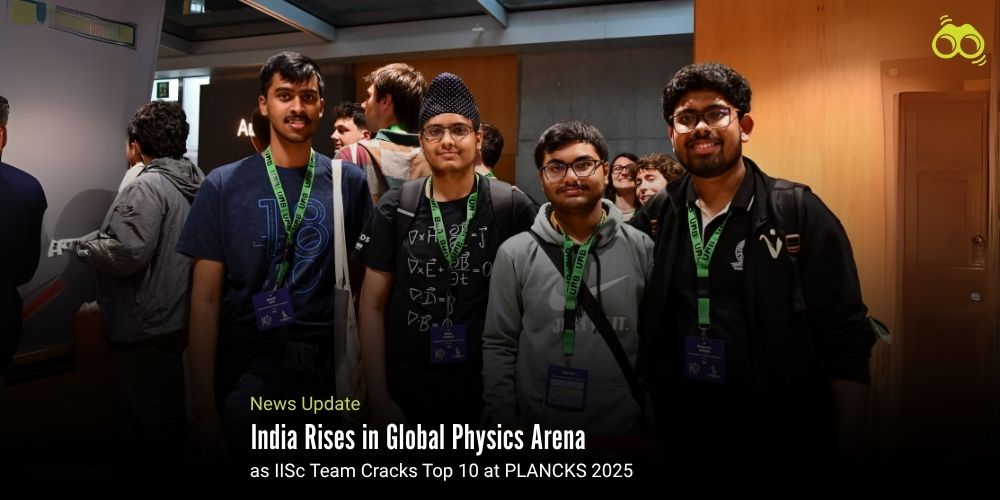PLANCKS 2025: IISc Team Sets New Benchmark for Indian Physics Students
IISc Undergraduates Secure India’s Best Performance in International Physics Contest
Indian students continue to excel globally, demonstrating exceptional academic prowess in science, technology, and research. Their problem-solving abilities and innovative thinking have enabled them to compete on prestigious international platforms, reinforcing India’s strong presence in global education and advancements.
A recent example of this excellence was the remarkable achievement of a four-member undergraduate team from the Indian Institute of Science (IISc) at PLANCKS 2025, a highly competitive international theoretical physics contest. The event brought together 200 students from 29 countries, showcasing some of the brightest young minds in the field. It commenced with a keynote lecture by Nobel Laureate Anne L’Huillier, followed by discussions on cutting-edge scientific topics, including gravitational wave detection and photonics.
The IISc team, known as The Denormalisation Group, comprising Simar Narula, Ritabrata Ghosh, Susmit Roy, and Avik Das, secured their place at PLANCKS 2025 by winning the Indian Young Physicist’s League (IYPL), the national qualifier. Their sixth-place finish marked India’s best-ever performance in the competition’s history, further solidifying the country’s standing in scientific research and problem-solving. Currently pursuing undergraduate physics at IISc, three members are in their second year, while one is in their first year. The competition, held in Barcelona from May 1 to 5, featured a challenging four-hour closed-book exam with problems beyond standard curricula. Among the most difficult questions was one requiring participants to calculate the age of the universe, using advanced concepts such as dark matter, cosmological constants, and field equations.
In an interview with a leading media outlet, the IISc students reportedly reflected on the complexity of the competition’s problems, stating that they demanded not only deep physics knowledge but also sharp logical reasoning and composure under pressure. They attributed their strong performance to the rigorous training and intellectually stimulating environment at IISc, which they felt helped them tackle such high-level challenges with confidence.
Beyond the competition, students had the opportunity to engage in academic and entrepreneurial experiences, visiting renowned research institutions such as the ALBA Synchrotron and the Institute of Photonic Sciences (ICFO), where they attended sessions with deep-tech startup founders. The experience was not purely academic, as participants also explored Barcelona’s historic streets, visiting iconic landmarks, including the Cathedral of Barcelona and Montjuïc Hill. Additionally, they had the chance to visit FC Barcelona’s current stadium, further enhancing the immersive nature of the programme.
The Office of Development and Alumni Affairs (ODAA) at IISc facilitated the students’ travel and participation, ensuring they could fully engage with the international learning environment. The success of the event has generated enthusiasm on campus, with many hoping it will inspire a new generation of Indian physics students to pursue global opportunities in academia and research. This achievement reinforces India’s presence in global scientific advancements and also sets a strong precedent for future students aiming for excellence on the international stage.
Editor’s Note:
The success of IISc students at PLANCKS 2025 reflects India’s growing prominence in global scientific competitions and underscores the country’s deep talent pool in theoretical physics. Their achievement is not just a milestone for IISc but a testament to the quality of scientific education and problem-solving capabilities nurtured in Indian institutions. With an intellectually rigorous environment and strong academic foundations, Indian students are proving they can compete with the brightest minds worldwide. However, while such accomplishments highlight India’s potential, they also serve as a reminder of the need for sustained investment in research and higher education. International exposure, competitive platforms, and access to cutting-edge resources will be crucial in ensuring that future students continue to thrive at the global level.
Skoobuzz firmly believes that as India aims to further establish itself as a leader in scientific innovation, fostering such opportunities must remain a priority.














0 Comments (Please Login To Continue)